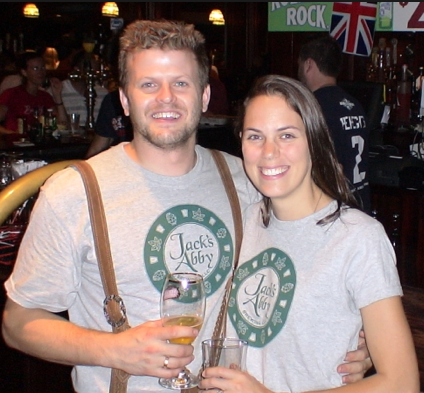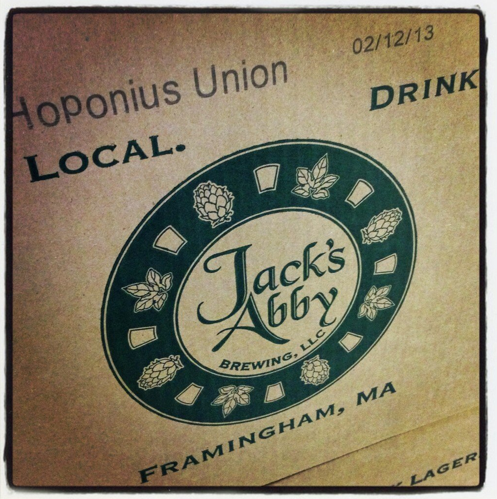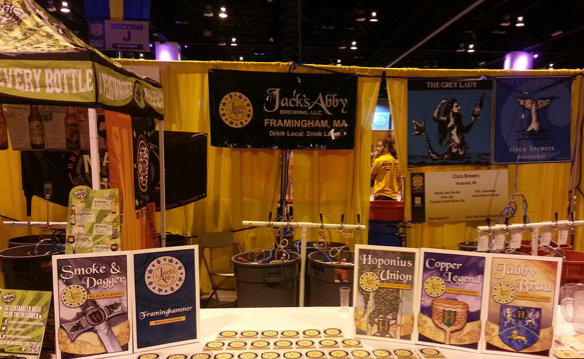Jack’s Abby has come a long way since it began operations in Framingham, but one thing that hasn’t changed over time is the terrible beer puns. If you haven’t seen Private Rye or Hurts Like Helles on the shelves, keep an eye out; the brews are even better than the wordplay.
I recently spoke to the man behind the puns and the beer to get his take on the last two years. Here’s what Jack Hendler, one of the founders of Jack’s Abby, had to say for himself.
 What sets you apart from other Boston breweries?
What sets you apart from other Boston breweries?
Every single batch of beer we brew uses locally sourced ingredients from Massachusetts. Our motto is drink local, drink lager – and how can you tell people to drink local if you’re not going to do anything local yourself? It’s a do right sort of attitude, and the best way for us to support the community.
Our main message to people is that we’re an all-lager brewery in an ale-centric craft brew world. We hear it less and less every week, but when people came into our tasting room for the first year, they often said “I don’t like lager,” and the question was, “What do you mean, you don’t like lager?” They’re referring to this association with white golden lager. We’re starting to educate people and give them a different perspective on what lager is and what it should be.
A lot of other breweries focus on ales – some English, some American, some Belgian. But there’s not a big emphasis at all – not just in Boston, but also countrywide – on brewing craft lagers.
 Why do you think that is?
Why do you think that is?
Time, money, and expertise. A lot of the guys who’ve opened recently have opened on fairly small systems, and you just don’t have the flexibility to brew for the longer fermentation and conditioning cycle. We went in knowing that we needed a bigger system to start out, even though we didn’t have the sales, because as soon as it catches on you need a lot more capacity. In 2011, we brewed 400 barrels of beer; in 2012, we brewed 2,500 barrels of beer; and in 2013, we plan to brew more than 6,000 barrels of beer. In 2014, we’re estimating somewhere in the 10-15,000 barrel range.
I saw that your 2nd Anniversary Lager’s on the shelves now. Are there any major lessons that you’ve learned in the past two years?
[Laughs] That’s a pretty open-ended question; I mean, how many things have we done wrong? The biggest thing is dealing with growth. There are so many parts; it’s employees, it’s raising money, it’s changing the way you do business. When you’re brewing once a week, bottling once a week, and not doing much else, it’s a lot different than having a full production schedule and working with multiple people. Keeping consistency, keeping quality control, and communicating with everyone, that just changes the whole operation. But that’s only on the brewing side, which in my opinion is the least time-consuming thing we do here, often. It’s everything else that makes running a brewery difficult.
The biggest thing is dealing with growth. There are so many parts; it’s employees, it’s raising money, it’s changing the way you do business. When you’re brewing once a week, bottling once a week, and not doing much else, it’s a lot different than having a full production schedule and working with multiple people. Keeping consistency, keeping quality control, and communicating with everyone, that just changes the whole operation. But that’s only on the brewing side, which in my opinion is the least time-consuming thing we do here, often. It’s everything else that makes running a brewery difficult.
I couldn’t tell you the last time I actually brewed a batch of beer; there are too many other things pulling me in different directions. We’ve got a team of brewers, a team of packaging guys, sales, events, begging the bank for a loan – even just talking with material companies for reformatting packaging from four-packs to six-packs. There’s a whole lot of time and effort involved in changing artwork, coordinating new suppliers to get us different packaging sizes – things that you don’t even think about when you decide you want to start brewing beer.
 American Craft Beer The Best Craft Beer, Breweries, Bars, Brewpubs, Beer Stores, And Restaurants Serving Serious Beer.
American Craft Beer The Best Craft Beer, Breweries, Bars, Brewpubs, Beer Stores, And Restaurants Serving Serious Beer.
